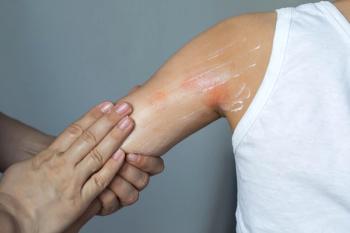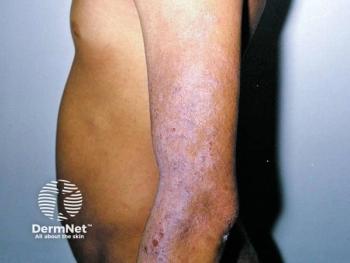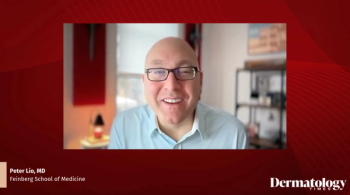
Dermatologists should 'raise the bar' in measuring psoriasis improvement
Such results show we can help our patients achieve higher levels of skin clearance for longer periods of time than ever before.
Controversy
However, even in our apparently enviable situation, there is controversy on how best to measure improvement of psoriatic lesions. I am a strong advocate of the Psoriasis Area Severity Index (PASI). I believe we should focus on the PASI score as the main tool for measuring improvement of psoriasis and that we should raise the bar on what is considered an acceptable level of improvement based on the fact that the newer biologics are so effective.
Posters presented at the summer meeting of the American Academy of Dermatology showed that after 10 weeks of treatment with infliximab, 80 percent of patients achieved PASI 75, and more than 57 percent achieved a PASI 90 response, compared with 2.6 percent and 1.3 percent in the placebo groups, respectively. This response was maintained with longer treatment. Such results show we can help our patients achieve higher levels of skin clearance for longer periods of time than ever before.
Ideal instrument
The PASI score has all the hallmarks of an ideal assessment instrument for clinical studies.
By measuring disease-specific features such as redness, scaling, induration and the area of skin involvement, the PASI is repeatable, reproducible and accurately assesses clinically relevant parameters. The PASI discriminates degrees of involvement and severity, and it finely differentiates effectiveness when comparing against placebo or between therapeutic regimens.
The fact that PASI scores are not generally used in clinical practice is a specious argument. For clinical research, a measure of disease must be a useful research instrument. Correlation with "clinical practice" follows with experience. PASI is not perfect primarily because of non-linear area weighting, but this is easily remedied, if necessary. Given the high efficacy of the new biologics, the nonlinearity is of minimal importance.
More subjective tools
Other tools for measuring psoriasis such as the Physician Global Assessment (PGA) and Dermatology Life Quality Index (DLQI), on the other hand, rely on more subjective criteria such as general impressions or the impact on personal relationships.
The PGA is a non-standardized instrument that, on the surface, appeals to clinical categorization of severity. In truth, the PGA is an insensitive, inaccurate, poorly discriminating tool that has no consistent definition - a very poor tool for clinical research. While the PGA and DLQI do measure relevant items, such as a semblance of overall clinical disease and the patient's general well-being, they are more effective as supplemental measures. Relying on the PGA or DLQI alone makes treatment decisions less precise and clinically less distinctive; both measures are coarse and subjective.
'Gold standard' for improvement
Once we agree to rely on the PASI, what then is the "gold standard" for improvement? How much improvement is good enough?
Some were pleased when our patients achieved PASI 50. I think PASI 50 is the threshold for a response signal. Now, when treatments are available that allow patients to achieve PASI 75 without significant side effects, we are at the point of clinical significance, and our patients are even more gratified. While PASI 75 is an arbitrary hurdle, it has turned out to be a realistic and clinically meaningful target. Many of the biologics allow patients to achieve PASI 75 with varying facility and aplomb. However, there is a clear trend to achieving even better responses from newer treatments. We should raise our sights.
Newsletter
Like what you’re reading? Subscribe to Dermatology Times for weekly updates on therapies, innovations, and real-world practice tips.












